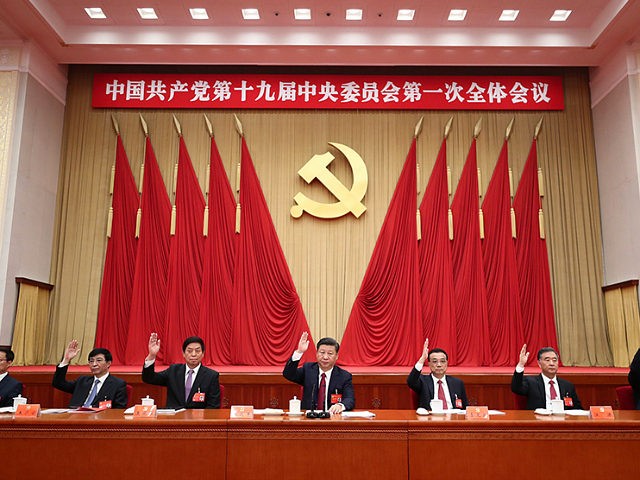Two weeks ago, Chinese dictator Xi Jinping gave a major speech at the opening of the 19th Congress of the Communist Party.
While the title of his speech, “Secure a Decisive Victory in Building a Moderately Prosperous Society in All Respects and Strive for the Great Success of Socialism with Chinese Characteristics for a New Era,” and its length (3.5 hours) seemed designed to lull the comrades to sleep, it should serve to awaken America.
Xi’s call for firmly establishing “Socialism with Chinese Characteristics” should not be confused with European style social-welfare state. This will not be a benevolent nanny-state, with a democratic political consensus. It is an aggressive, sincerely Communist dictatorship, using the power of capitalism as a tool to achieve socialist ends (a dichotomy Marx understood well).
Xi’s text is a great instrument for understanding what our 45 years of engagement with Beijing has wrought. When Kissinger and Nixon made their famous parlays in the 1970s China was, for the most part, a nation of subsistence farmers in a state not much different from the middle ages. Some of that still exists in China’s West, but it has been overshadowed by the technical and economic development of China’s massive and modern urban world.
Xi’s education serves as the ironically perfect metaphor for China’s ascendancy, funded by American consumers. Xi’s vision is Marxist, authoritarian and focused on preserving the current regime. Xi, a devout Communist, earned degrees in Marxist theory and ideological and political education at Tsinghua University. Tsinghua was established when President Teddy Roosevelt used the American portion of Boxer Rebellion indemnity funds (imposed by Europe) for the benefit of Chinese students. Tsinghua was built with some of these funds as a preparatory college for sending Chinese students to the U.S. Most of the university’s initial faculty members were from the U.S. and the university was strongly engaged with the American YMCA in its early years.
We should admire Xi’s awareness that governments grow national economies by investing in technology development, encouraging manufacturing and fueling exports, not by manipulating interest rates. This strategy has and will continue to work. That is exactly how America grew rich in powerful in both the 19th and 20th centuries, before we fell into the hands of a gang of pernicious economic modelers. The most important statement in Xi’s long-winded talk is:
We will strengthen basic research in applied sciences, launch major national science and technology projects, and prioritize innovation in key generic technologies, cutting-edge frontier technologies, modern engineering technologies, and disruptive technologies. These efforts will provide powerful support for building China’s strength in science and technology, product quality, aerospace, cyberspace, and transportation; and for building a digital China and a smart society.
We will improve our national innovation system and boost our strategic scientific and technological strength. We will further reform the management system for science and technology, and develop a market-oriented system for technological innovation in which enterprises are the main players and synergy is created through the joint efforts of enterprises, universities, and research institutes. We will support innovation by small and medium-sized enterprises and encourage the application of advances in science and technology.
We will foster a culture of innovation, and strengthen the creation, protection, and application of intellectual property. We should cultivate a large number of world-class scientists and technologists in strategically important fields, scientific and technological leaders, and young scientists and engineers, as well as high-performing innovation teams.
Xi’s speech makes it clear that we face a well-educated and technically advanced China, enriched with trillions in Western investment and American consumer dollars. The country is ready to claim the national ascendancy that position enables. He underscored that with a commitment to use all that to build a world-class military machine:
We should ensure that efforts to make our country prosperous and efforts to make our military strong go hand in hand. We will strengthen unified leadership, top-level design, reform, and innovation. We will speed up implementation of major projects, deepen reform of defense-related science, technology, and industry achieve greater military-civilian integration, and build integrated national strategies and strategic capabilities.
Just what sort of country will be wielding this economic prowess and military technology? Understanding China’s intentions for the world leadership start with understanding China’s domestic behavior. When Xi’s calls for “safeguarding political security as a fundamental task,” he is signaling an even stronger hand for his domestic police forces to ensure the continued domination of the Community Party and to repress political opponents. Control has been a trademark of Xi’s ascendency. Under his reign, censorship and repression of political, ideological and religious opposition to the Communist party have significantly increased.
It has been my experience in confronting China’s American apologists that they have shifted to accommodating Xi’s crackdown by tilting their rhetoric away from the tired slogan of “China needs time to progress toward democracy” slogan. Instead, they have begun to openly dismiss the universality of democratic values we used to cherish as Americans. Wall Street bankers, Silicon Valley venture capitalists, and congressional staffers who fall into this category will happily explain to those of us still obsessed with antiquated ideals like civil liberties and human rights that “each country has its own approach to social and political development” and that imposing our peculiar Western values (religious freedom, fair elections, etc.) on other nations is “imperialistic.” This new view was nicely ushered in with a 2012 New York Times article entitled “Why China’s Political Model Is Superior.” In it, venture capitalist Eric X. Li praised the stability and economic opportunity created by China’s Tiananmen massacre and ended with the prophetic conclusion that, “History does not bode well for the American way.”
Dr. Autry serves on the advisory board of the Coalition for a Prosperous America. He researches and writes on entrepreneurship, technology, space and trade policy.

COMMENTS
Please let us know if you're having issues with commenting.